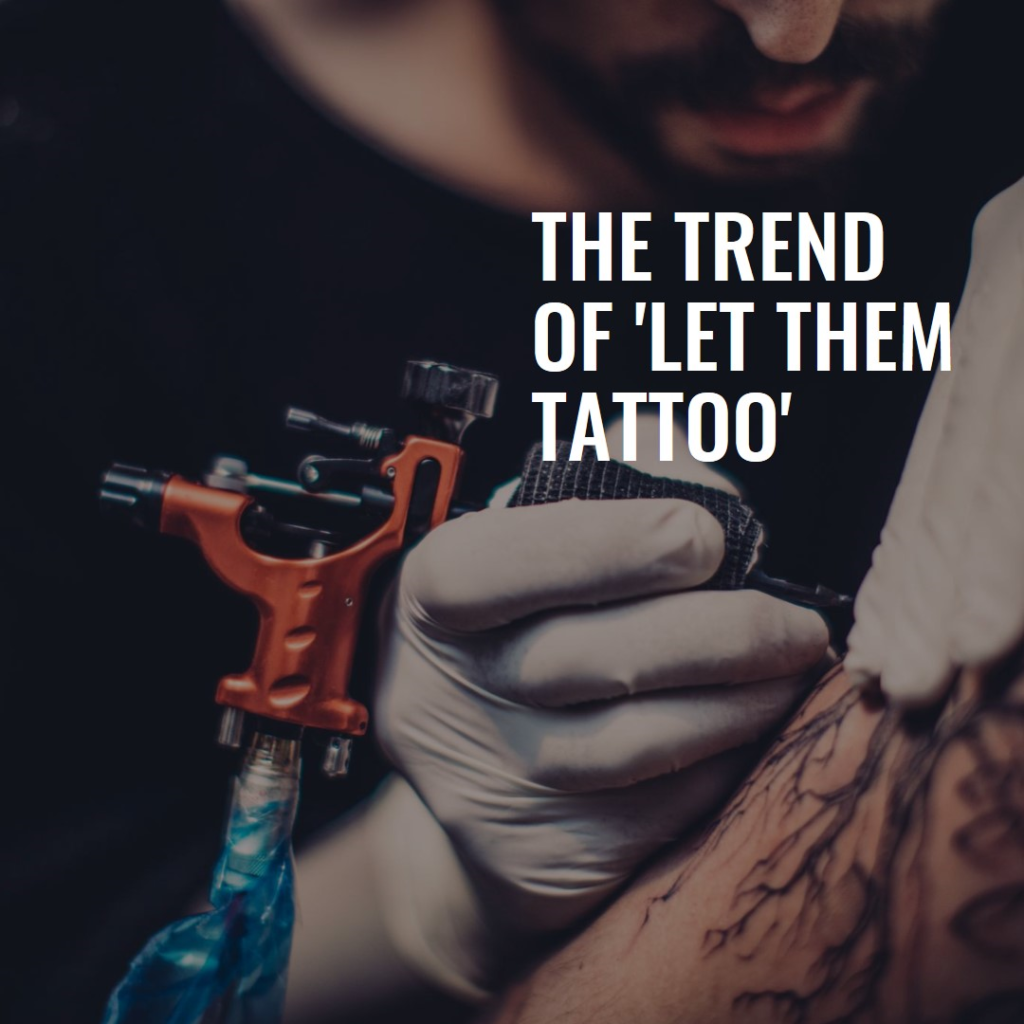In recent years, the phenomenon of ‘Let Them Tattoo’ has garnered significant attention within the body art community. ‘Let Them Tattoo’ represents a departure from conventional tattoo practices, where individuals relinquish control over the design process to others, often without prior knowledge of the outcome. This trend, characterized by spontaneity and relinquishment of control, has sparked intense debate regarding empowerment and exploitation within the tattoo community. As ‘Let Them Tattoo’ continues to gain traction, it is essential to examine its implications and complexities, considering both its potential for empowerment and the risks of exploitation.
This exploration seeks to delve into the multifaceted nature of ‘tattoo, shedding light on its cultural significance, ethical considerations, and implications for personal expression. Through critical analysis and dialogue, we aim to navigate the nuances of this evolving trend and its impact on contemporary body art culture.
Understanding ‘Let Them Tattoo:
‘Let Them Tattoo’ is a bold departure from traditional tattoo practices, where clients carefully select designs and artists, often after thorough consultations and considerations. In contrast, this trend involves individuals relinquishing control over the tattooing process to friends, family members, or even strangers, granting them carte blanche to create permanent artwork on their bodies.
The Allure of Spontaneity
At its core, ‘Let Them Tattoo’ embodies spontaneity and relinquishment of control. For many participants, the allure lies in the excitement of the unknown and the thrill of embracing the unexpected. By embracing this trend, individuals seek to challenge societal norms and assert their autonomy over their bodies.
However, the spontaneity of ‘tattoo’ also raises concerns about consent and responsibility. While some view it as a liberating form of self-expression, others argue that it can easily veer into exploitation, especially when participants are coerced or under the influence of substances.
Exploring the Empowerment Narrative:
Proponents of ‘Tattoo’ argue that the trend fosters a sense of empowerment and community. By inviting others to participate in the tattooing process, individuals forge deeper connections and create lasting memories. For some, the act of relinquishing control over their bodies is an empowering gesture, symbolizing trust and vulnerability.
Moreover, ‘tattoo’ provides a platform for amateur artists to showcase their skills and creativity. In an era dominated by professional tattoo studios, this trend democratizes the art form, allowing enthusiasts of all skill levels to leave their mark on willing canvases.
Navigating the Thin Line Between Empowerment and Exploitation
Despite its purported benefits, ‘Let Them Tattoo’ is not without its ethical dilemmas. Critics argue that the trend trivializes the art of tattooing and undermines the expertise of professional artists. Moreover, the lack of oversight and accountability raises concerns about hygiene, safety, and long-term regret.
Furthermore, ‘Let Them Tattoo’ can inadvertently perpetuate harmful stereotypes and cultural appropriation. Without proper education and understanding of tattooing’s cultural significance, participants risk appropriating symbols and imagery without appreciation for their deeper meanings.
Promoting Informed Consent and Responsible Tattooing
As ‘Let Them Tattoo‘ continues to gain popularity, it is imperative to promote informed consent and responsible tattooing practices. Participants must understand the risks involved and consent to the process willingly, free from coercion or duress. Likewise, artists should prioritize safety and hygiene standards, regardless of the spontaneity of the tattooing session.
Education also plays a crucial role in mitigating the risks associated with ‘tattoo’. By fostering dialogue and promoting cultural awareness, individuals can make more informed decisions about the designs they choose to permanently ink on their bodies.
Conclusion:
‘Let Them Tattoo’ represents a departure from conventional tattooing practices, challenging notions of control, consent, and artistic ownership. While some view it as a form of empowerment and self-expression, others caution against its potential for exploitation and cultural insensitivity.
As the tattoo community continues to evolve, it is essential to strike a balance between spontaneity and responsibility. By promoting informed consent, cultural sensitivity, and ethical tattooing practices, we can ensure that ‘Tattoo’ remains a positive and inclusive aspect of contemporary body art culture. Ultimately, whether it is seen as an act of empowerment or exploitation depends on the context in which it is practiced and the values it upholds.
FAQs About ‘Let Them Tattoo’
Is ‘Let Them Tattoo’ Safe?
While ‘Let Them Tattoo‘ can be safe when practiced under hygienic conditions and with proper consent, there are inherent risks associated with the lack of professional oversight and expertise. Participants should prioritize safety and research potential risks before engaging in ‘Let Them Tattoo’ sessions.
How Can I Ensure a Positive ‘Let Them Tattoo’ Experience?
To ensure a positive experience, communicate openly with the individual tattooing you and establish clear expectations regarding design, placement, and aftercare. Prioritize safety and hygiene by using sterile equipment and following recommended aftercare procedures.
What Are Some Considerations Before Participating in ‘Let Them Tattoo’?
Before participating in ‘tattoo’, consider the permanence of the decision and its potential impact on your personal and professional life. Research cultural significance and symbolism associated with tattoo designs to avoid inadvertent cultural appropriation.
Can ‘Let Them Tattoo’ Be Considered Cultural Appropriation?
Without proper understanding and respect for cultural symbols and imagery, ‘Tattoo’ runs the risk of cultural appropriation. Participants should educate themselves on the cultural significance of their chosen designs and engage in meaningful dialogue to promote cultural appreciation and sensitivity.
